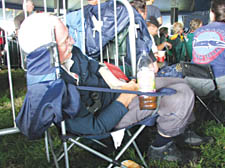|
|
 |
| |

A Glastonbury reveller doesn’t let the music get in the way of his afternoon nap |
Wake up to sleep secrets
From the Industrial Revolution’s rude awakening to snoozing through the Blitz, Sean Coughlan celebrates the history of napping and puts many myths to bed
THE SLEEPYHEAD’S BEDSIDE COMPANION
Preface - £12.99
WHY can’t we admit to how much we enjoy sleep? It’s the most glorious, restorative pleasure, something that improves mind and body. But admitting to really enjoying sleep remains a guilty secret.
Sleeping for its own sake, for the sheer pleasure of resting, is seen as wasteful, slothful, idle and a whole list of things that the Old Testament wouldn’t have liked very much.
Ambitious people boast of how little they sleep. Sophisticated people show off about food and wine, maybe even a little sex, but never the spectacular snoring that follows all of these.
So what’s so wrong about sleeping? You need sleep as much as food. It is literally torture to be deprived of sleep. But we never appreciate it. Instead we distrust it or make a virtue of doing without sleep.
When haggard, panda-eyed politicians appear on screen, after long negotiations, they want to be congratulated for how little sleep they’ve had. How absurd is it that we leave the biggest decisions to the most sleep-deprived?
Anyone who has stayed up all night with a crying baby will know that even the simplest decision becomes impossible when you’ve not had any sleep. You can agonise in bleary-eyed exhaustion over which breakfast cereal to choose. Try running the country like that.
So why do we disregard sleep, going to bed too late, not napping in the afternoon and not savouring it the way that we should?
Not only do we miss out on the physical benefits of sleep, we overlook its culture and its history.
Sleep has its own literature. Shakespeare was fascinated by the relationship between sleep and death. Samuel Johnson praised it as the most egalitarian of all pleasures, the “impartial benefactor” helping rich and poor alike.
And the objects associated with sleep have their own exotic origins. Look around the bedroom – pyjamas come from the Indian Raj, mattresses from the Middle East and electric blankets, invented for patients in TB clinics in the 1920s.
Even the pillow has its own story. Did you know that when Elizabethan men started using pillows they were ridiculed for being effeminate, soft southerners?
The hard men of the era boasted that they used wooden logs or sacks on which to rest their macho heads.
Patterns of sleep also have their own history. Before the Industrial Revolution, it would have been quite usual to sleep in the afternoon or to have two separate stretches of sleep in a night.
It would also have been usual for people, other than couples, to share a bed. Families slept together in an arrangement known as “pigging” and travellers staying in roadside inns would often have been expected to share a bed with a stranger.
There were records of human hibernation in Russia and France, with people conserving energy and resources in the lean months.
There is also nothing inevitable or natural about cramming all the day’s sleep into a single stretch at night time. This was a by-product of the industrial age. The factory day created the need for a single shift of sleep, resting the workers for the following day’s labour. Sleep has always been the first casualty of work.
Craftsmen in the 19th century, reluctant to become part of the factory system, tried to keep their own hours, defending the right to sleep late after the weekend on what they called the feast of “St Monday”.
Even though it’s often repeated how little sleep was needed by Margaret Thatcher, there were plenty of other leaders who have been heroic sleepers. Winston Churchill slept every afternoon, even in the darkest days of the Blitz, and Alexander the Great and the Emperor Augustus were known for the psychological habit of falling asleep at moments of extreme pressure before a battle.
And anyone struggling to sleep might be interested in the long history of trying to tackle insomnia. The Elizabethans recommended dormouse fat while the Victorians used opium, cannabis and champagne.
If all that makes you feel tired, there’s even a word to describe that really pleasurable moment of stretching and yawning – it’s called “pandiculating”.
Sleep is nature’s greatest free gift. We should all be making the most of it rather than missing out. It’s not worth getting into bed for anything less.
|
 |
|
 |
 |
|
 |
|


